Ethnography Based Research: A Researcher Keeping History Alive
VerifiedAdded on 2023/06/05
|8
|2046
|391
Essay
AI Summary
This essay examines the role of ethnography-based research in preserving history and capturing the social and cultural nuances that traditional historical accounts often miss. It emphasizes the importance of qualitative research methods, such as participant observation, interviews, and focus groups, in providing in-depth perspectives and individual experiences. The essay references Loïc Wacquant's research as an example, highlighting how ethnographic studies can reveal underlying social dynamics and challenge mainstream historical narratives. It also discusses the advantages and disadvantages of ethnographic approaches, emphasizing the need for researchers to maintain objectivity and avoid biased interpretations. The essay concludes that ethnography can complement historical records by providing richer, more contextualized understandings of the past, while also acknowledging the limitations of relying solely on qualitative data.

Running Head: THE ROLE OF A RESEARCHER IN KEEPING THE HISTORY ALIVE FOR THE NEXT
GENERATIONS WITH ETHNOGRAPHY BASED RESEARCHES
NAME
1
GENERATIONS WITH ETHNOGRAPHY BASED RESEARCHES
NAME
1
Paraphrase This Document
Need a fresh take? Get an instant paraphrase of this document with our AI Paraphraser
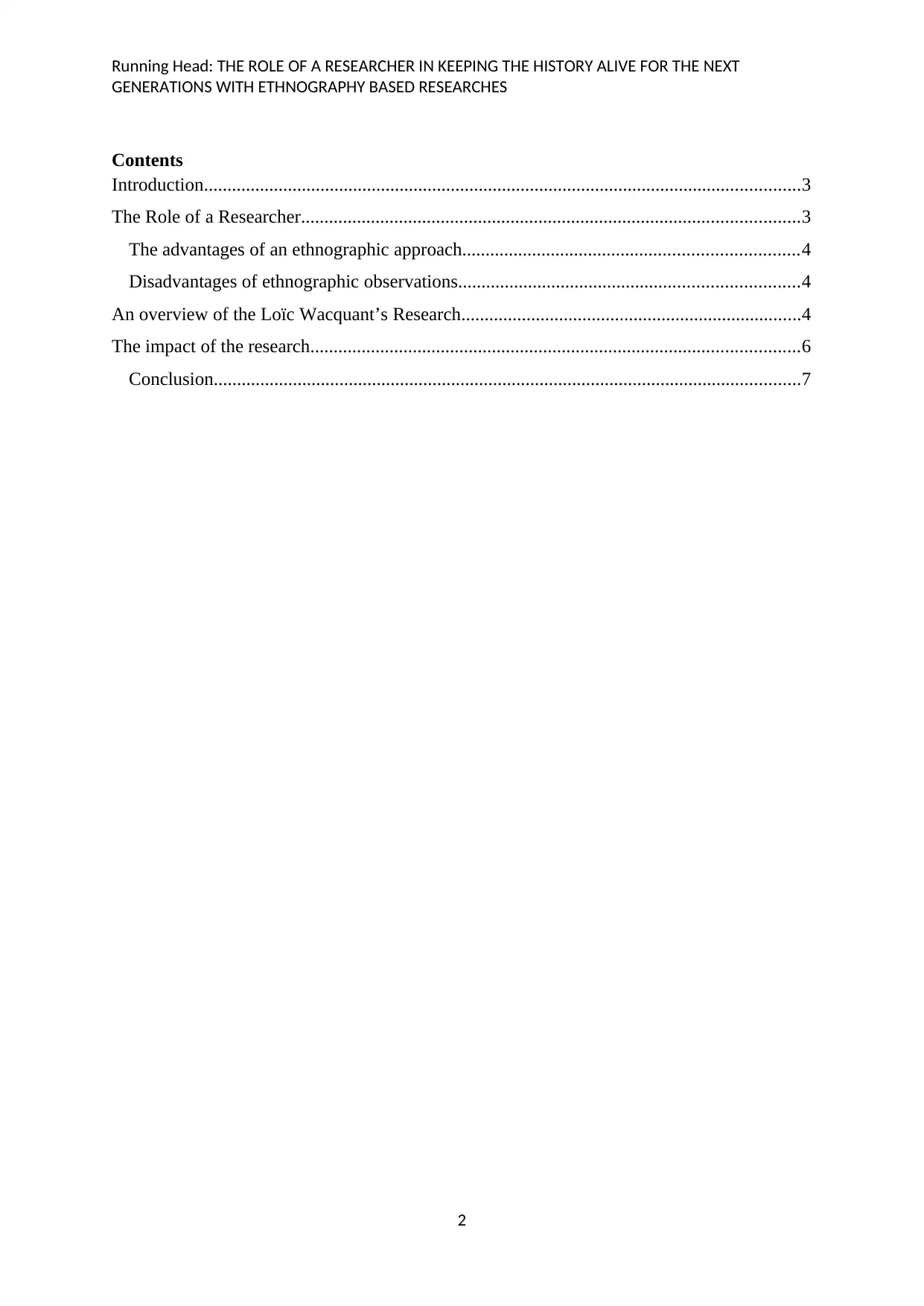
Running Head: THE ROLE OF A RESEARCHER IN KEEPING THE HISTORY ALIVE FOR THE NEXT
GENERATIONS WITH ETHNOGRAPHY BASED RESEARCHES
Contents
Introduction................................................................................................................................3
The Role of a Researcher...........................................................................................................3
The advantages of an ethnographic approach........................................................................4
Disadvantages of ethnographic observations.........................................................................4
An overview of the Loïc Wacquant’s Research.........................................................................4
The impact of the research.........................................................................................................6
Conclusion..............................................................................................................................7
2
GENERATIONS WITH ETHNOGRAPHY BASED RESEARCHES
Contents
Introduction................................................................................................................................3
The Role of a Researcher...........................................................................................................3
The advantages of an ethnographic approach........................................................................4
Disadvantages of ethnographic observations.........................................................................4
An overview of the Loïc Wacquant’s Research.........................................................................4
The impact of the research.........................................................................................................6
Conclusion..............................................................................................................................7
2
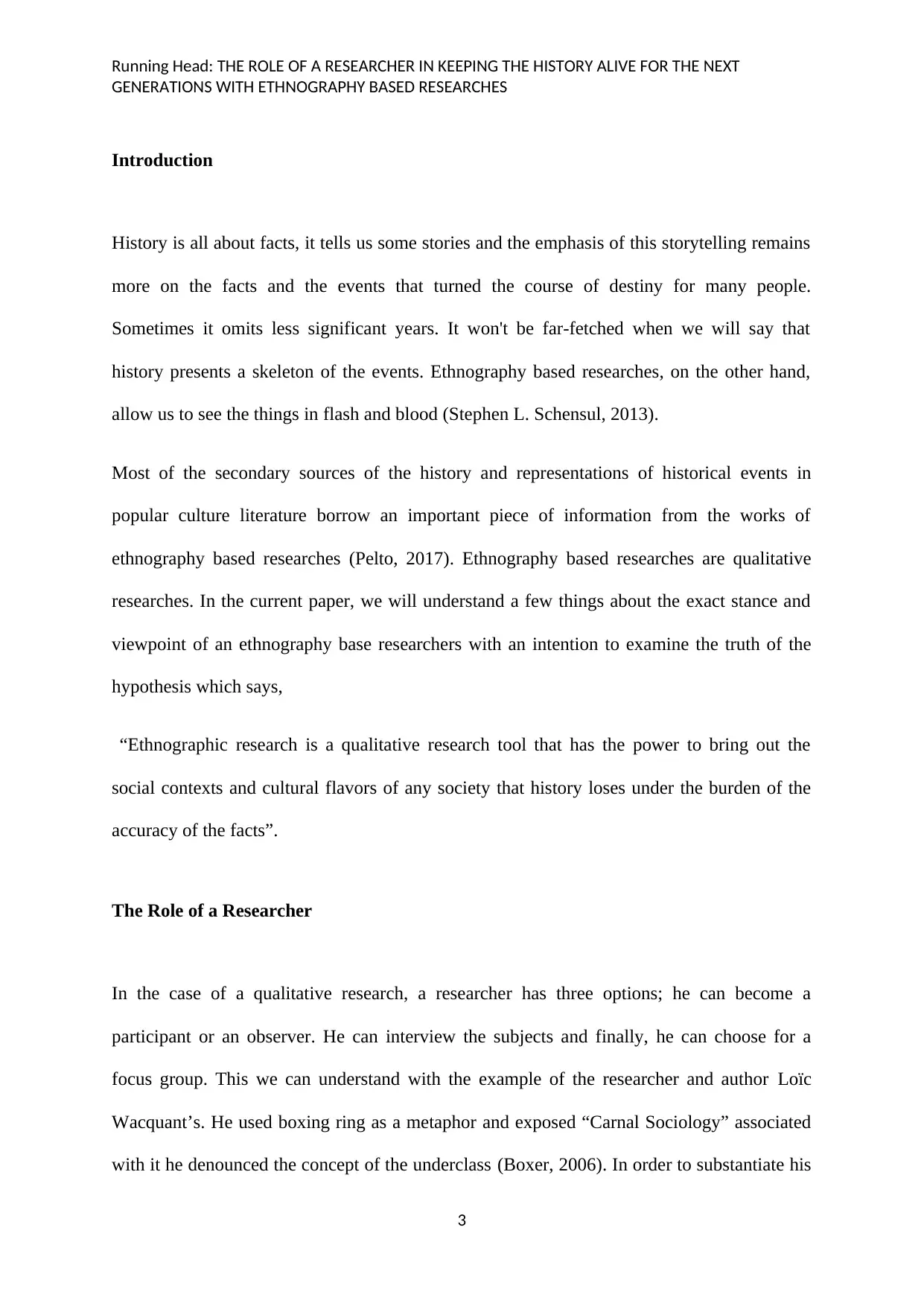
Running Head: THE ROLE OF A RESEARCHER IN KEEPING THE HISTORY ALIVE FOR THE NEXT
GENERATIONS WITH ETHNOGRAPHY BASED RESEARCHES
Introduction
History is all about facts, it tells us some stories and the emphasis of this storytelling remains
more on the facts and the events that turned the course of destiny for many people.
Sometimes it omits less significant years. It won't be far-fetched when we will say that
history presents a skeleton of the events. Ethnography based researches, on the other hand,
allow us to see the things in flash and blood (Stephen L. Schensul, 2013).
Most of the secondary sources of the history and representations of historical events in
popular culture literature borrow an important piece of information from the works of
ethnography based researches (Pelto, 2017). Ethnography based researches are qualitative
researches. In the current paper, we will understand a few things about the exact stance and
viewpoint of an ethnography base researchers with an intention to examine the truth of the
hypothesis which says,
“Ethnographic research is a qualitative research tool that has the power to bring out the
social contexts and cultural flavors of any society that history loses under the burden of the
accuracy of the facts”.
The Role of a Researcher
In the case of a qualitative research, a researcher has three options; he can become a
participant or an observer. He can interview the subjects and finally, he can choose for a
focus group. This we can understand with the example of the researcher and author Loïc
Wacquant’s. He used boxing ring as a metaphor and exposed “Carnal Sociology” associated
with it he denounced the concept of the underclass (Boxer, 2006). In order to substantiate his
3
GENERATIONS WITH ETHNOGRAPHY BASED RESEARCHES
Introduction
History is all about facts, it tells us some stories and the emphasis of this storytelling remains
more on the facts and the events that turned the course of destiny for many people.
Sometimes it omits less significant years. It won't be far-fetched when we will say that
history presents a skeleton of the events. Ethnography based researches, on the other hand,
allow us to see the things in flash and blood (Stephen L. Schensul, 2013).
Most of the secondary sources of the history and representations of historical events in
popular culture literature borrow an important piece of information from the works of
ethnography based researches (Pelto, 2017). Ethnography based researches are qualitative
researches. In the current paper, we will understand a few things about the exact stance and
viewpoint of an ethnography base researchers with an intention to examine the truth of the
hypothesis which says,
“Ethnographic research is a qualitative research tool that has the power to bring out the
social contexts and cultural flavors of any society that history loses under the burden of the
accuracy of the facts”.
The Role of a Researcher
In the case of a qualitative research, a researcher has three options; he can become a
participant or an observer. He can interview the subjects and finally, he can choose for a
focus group. This we can understand with the example of the researcher and author Loïc
Wacquant’s. He used boxing ring as a metaphor and exposed “Carnal Sociology” associated
with it he denounced the concept of the underclass (Boxer, 2006). In order to substantiate his
3
⊘ This is a preview!⊘
Do you want full access?
Subscribe today to unlock all pages.

Trusted by 1+ million students worldwide
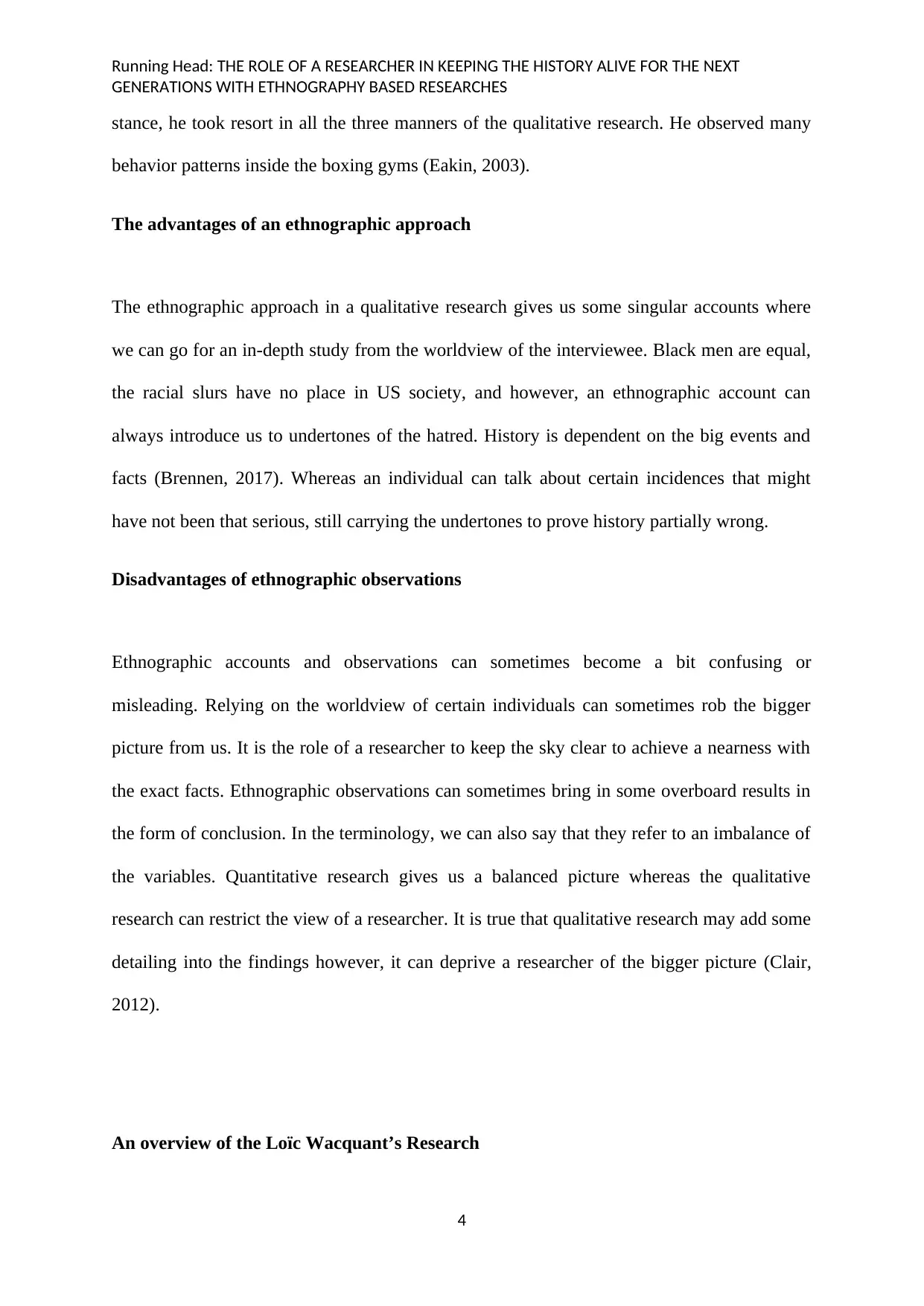
Running Head: THE ROLE OF A RESEARCHER IN KEEPING THE HISTORY ALIVE FOR THE NEXT
GENERATIONS WITH ETHNOGRAPHY BASED RESEARCHES
stance, he took resort in all the three manners of the qualitative research. He observed many
behavior patterns inside the boxing gyms (Eakin, 2003).
The advantages of an ethnographic approach
The ethnographic approach in a qualitative research gives us some singular accounts where
we can go for an in-depth study from the worldview of the interviewee. Black men are equal,
the racial slurs have no place in US society, and however, an ethnographic account can
always introduce us to undertones of the hatred. History is dependent on the big events and
facts (Brennen, 2017). Whereas an individual can talk about certain incidences that might
have not been that serious, still carrying the undertones to prove history partially wrong.
Disadvantages of ethnographic observations
Ethnographic accounts and observations can sometimes become a bit confusing or
misleading. Relying on the worldview of certain individuals can sometimes rob the bigger
picture from us. It is the role of a researcher to keep the sky clear to achieve a nearness with
the exact facts. Ethnographic observations can sometimes bring in some overboard results in
the form of conclusion. In the terminology, we can also say that they refer to an imbalance of
the variables. Quantitative research gives us a balanced picture whereas the qualitative
research can restrict the view of a researcher. It is true that qualitative research may add some
detailing into the findings however, it can deprive a researcher of the bigger picture (Clair,
2012).
An overview of the Loïc Wacquant’s Research
4
GENERATIONS WITH ETHNOGRAPHY BASED RESEARCHES
stance, he took resort in all the three manners of the qualitative research. He observed many
behavior patterns inside the boxing gyms (Eakin, 2003).
The advantages of an ethnographic approach
The ethnographic approach in a qualitative research gives us some singular accounts where
we can go for an in-depth study from the worldview of the interviewee. Black men are equal,
the racial slurs have no place in US society, and however, an ethnographic account can
always introduce us to undertones of the hatred. History is dependent on the big events and
facts (Brennen, 2017). Whereas an individual can talk about certain incidences that might
have not been that serious, still carrying the undertones to prove history partially wrong.
Disadvantages of ethnographic observations
Ethnographic accounts and observations can sometimes become a bit confusing or
misleading. Relying on the worldview of certain individuals can sometimes rob the bigger
picture from us. It is the role of a researcher to keep the sky clear to achieve a nearness with
the exact facts. Ethnographic observations can sometimes bring in some overboard results in
the form of conclusion. In the terminology, we can also say that they refer to an imbalance of
the variables. Quantitative research gives us a balanced picture whereas the qualitative
research can restrict the view of a researcher. It is true that qualitative research may add some
detailing into the findings however, it can deprive a researcher of the bigger picture (Clair,
2012).
An overview of the Loïc Wacquant’s Research
4
Paraphrase This Document
Need a fresh take? Get an instant paraphrase of this document with our AI Paraphraser
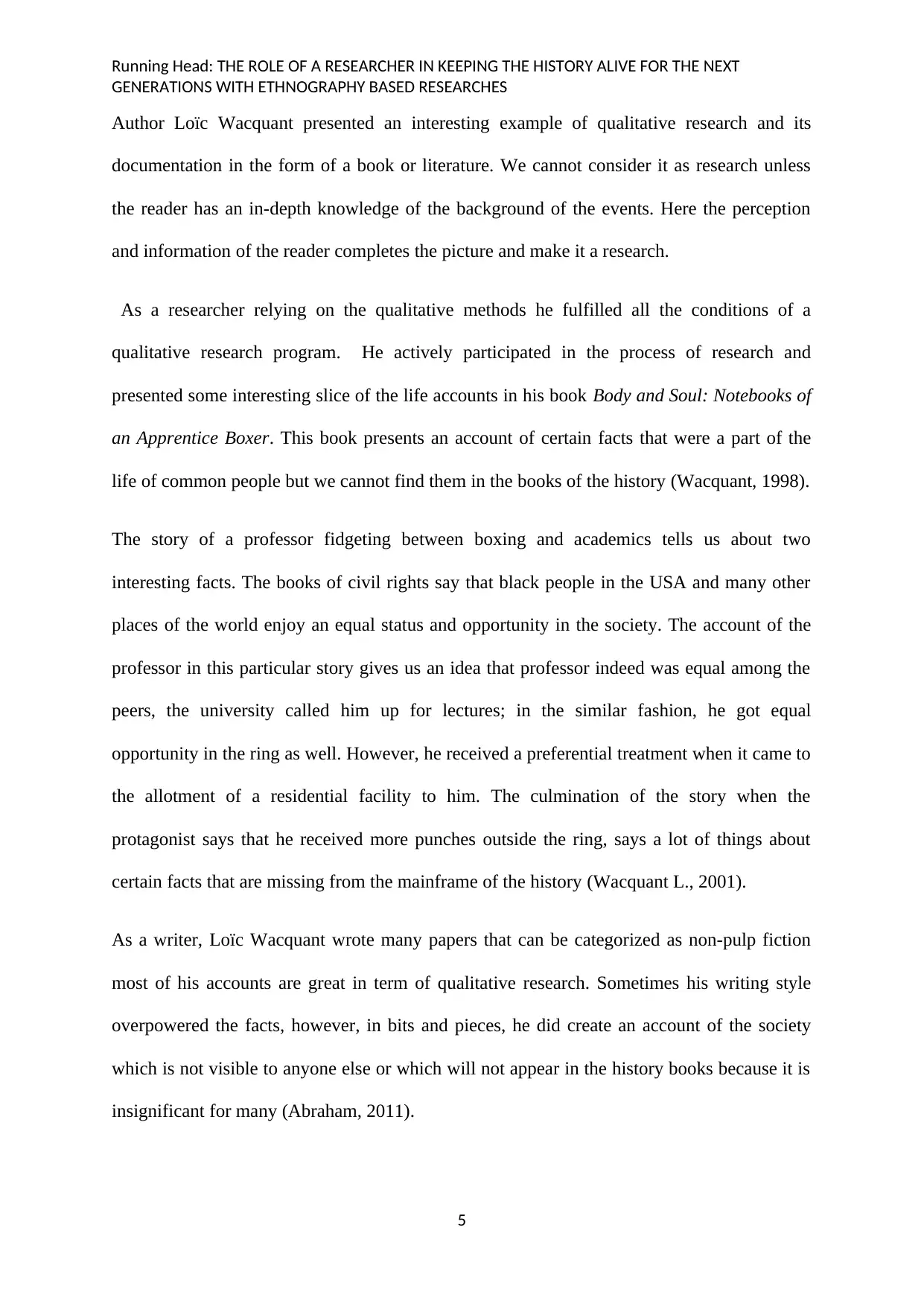
Running Head: THE ROLE OF A RESEARCHER IN KEEPING THE HISTORY ALIVE FOR THE NEXT
GENERATIONS WITH ETHNOGRAPHY BASED RESEARCHES
Author Loïc Wacquant presented an interesting example of qualitative research and its
documentation in the form of a book or literature. We cannot consider it as research unless
the reader has an in-depth knowledge of the background of the events. Here the perception
and information of the reader completes the picture and make it a research.
As a researcher relying on the qualitative methods he fulfilled all the conditions of a
qualitative research program. He actively participated in the process of research and
presented some interesting slice of the life accounts in his book Body and Soul: Notebooks of
an Apprentice Boxer. This book presents an account of certain facts that were a part of the
life of common people but we cannot find them in the books of the history (Wacquant, 1998).
The story of a professor fidgeting between boxing and academics tells us about two
interesting facts. The books of civil rights say that black people in the USA and many other
places of the world enjoy an equal status and opportunity in the society. The account of the
professor in this particular story gives us an idea that professor indeed was equal among the
peers, the university called him up for lectures; in the similar fashion, he got equal
opportunity in the ring as well. However, he received a preferential treatment when it came to
the allotment of a residential facility to him. The culmination of the story when the
protagonist says that he received more punches outside the ring, says a lot of things about
certain facts that are missing from the mainframe of the history (Wacquant L., 2001).
As a writer, Loïc Wacquant wrote many papers that can be categorized as non-pulp fiction
most of his accounts are great in term of qualitative research. Sometimes his writing style
overpowered the facts, however, in bits and pieces, he did create an account of the society
which is not visible to anyone else or which will not appear in the history books because it is
insignificant for many (Abraham, 2011).
5
GENERATIONS WITH ETHNOGRAPHY BASED RESEARCHES
Author Loïc Wacquant presented an interesting example of qualitative research and its
documentation in the form of a book or literature. We cannot consider it as research unless
the reader has an in-depth knowledge of the background of the events. Here the perception
and information of the reader completes the picture and make it a research.
As a researcher relying on the qualitative methods he fulfilled all the conditions of a
qualitative research program. He actively participated in the process of research and
presented some interesting slice of the life accounts in his book Body and Soul: Notebooks of
an Apprentice Boxer. This book presents an account of certain facts that were a part of the
life of common people but we cannot find them in the books of the history (Wacquant, 1998).
The story of a professor fidgeting between boxing and academics tells us about two
interesting facts. The books of civil rights say that black people in the USA and many other
places of the world enjoy an equal status and opportunity in the society. The account of the
professor in this particular story gives us an idea that professor indeed was equal among the
peers, the university called him up for lectures; in the similar fashion, he got equal
opportunity in the ring as well. However, he received a preferential treatment when it came to
the allotment of a residential facility to him. The culmination of the story when the
protagonist says that he received more punches outside the ring, says a lot of things about
certain facts that are missing from the mainframe of the history (Wacquant L., 2001).
As a writer, Loïc Wacquant wrote many papers that can be categorized as non-pulp fiction
most of his accounts are great in term of qualitative research. Sometimes his writing style
overpowered the facts, however, in bits and pieces, he did create an account of the society
which is not visible to anyone else or which will not appear in the history books because it is
insignificant for many (Abraham, 2011).
5
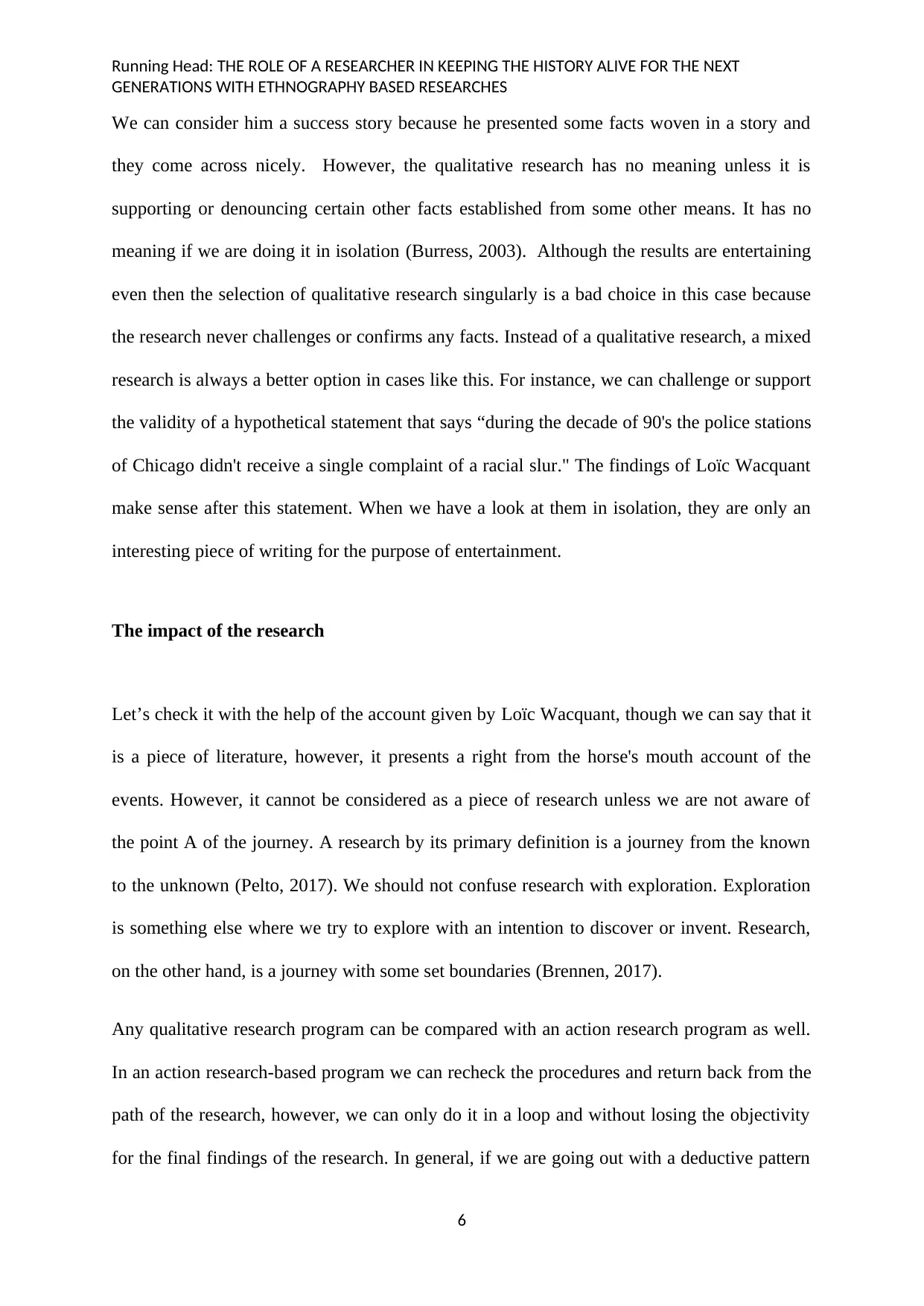
Running Head: THE ROLE OF A RESEARCHER IN KEEPING THE HISTORY ALIVE FOR THE NEXT
GENERATIONS WITH ETHNOGRAPHY BASED RESEARCHES
We can consider him a success story because he presented some facts woven in a story and
they come across nicely. However, the qualitative research has no meaning unless it is
supporting or denouncing certain other facts established from some other means. It has no
meaning if we are doing it in isolation (Burress, 2003). Although the results are entertaining
even then the selection of qualitative research singularly is a bad choice in this case because
the research never challenges or confirms any facts. Instead of a qualitative research, a mixed
research is always a better option in cases like this. For instance, we can challenge or support
the validity of a hypothetical statement that says “during the decade of 90's the police stations
of Chicago didn't receive a single complaint of a racial slur." The findings of Loïc Wacquant
make sense after this statement. When we have a look at them in isolation, they are only an
interesting piece of writing for the purpose of entertainment.
The impact of the research
Let’s check it with the help of the account given by Loïc Wacquant, though we can say that it
is a piece of literature, however, it presents a right from the horse's mouth account of the
events. However, it cannot be considered as a piece of research unless we are not aware of
the point A of the journey. A research by its primary definition is a journey from the known
to the unknown (Pelto, 2017). We should not confuse research with exploration. Exploration
is something else where we try to explore with an intention to discover or invent. Research,
on the other hand, is a journey with some set boundaries (Brennen, 2017).
Any qualitative research program can be compared with an action research program as well.
In an action research-based program we can recheck the procedures and return back from the
path of the research, however, we can only do it in a loop and without losing the objectivity
for the final findings of the research. In general, if we are going out with a deductive pattern
6
GENERATIONS WITH ETHNOGRAPHY BASED RESEARCHES
We can consider him a success story because he presented some facts woven in a story and
they come across nicely. However, the qualitative research has no meaning unless it is
supporting or denouncing certain other facts established from some other means. It has no
meaning if we are doing it in isolation (Burress, 2003). Although the results are entertaining
even then the selection of qualitative research singularly is a bad choice in this case because
the research never challenges or confirms any facts. Instead of a qualitative research, a mixed
research is always a better option in cases like this. For instance, we can challenge or support
the validity of a hypothetical statement that says “during the decade of 90's the police stations
of Chicago didn't receive a single complaint of a racial slur." The findings of Loïc Wacquant
make sense after this statement. When we have a look at them in isolation, they are only an
interesting piece of writing for the purpose of entertainment.
The impact of the research
Let’s check it with the help of the account given by Loïc Wacquant, though we can say that it
is a piece of literature, however, it presents a right from the horse's mouth account of the
events. However, it cannot be considered as a piece of research unless we are not aware of
the point A of the journey. A research by its primary definition is a journey from the known
to the unknown (Pelto, 2017). We should not confuse research with exploration. Exploration
is something else where we try to explore with an intention to discover or invent. Research,
on the other hand, is a journey with some set boundaries (Brennen, 2017).
Any qualitative research program can be compared with an action research program as well.
In an action research-based program we can recheck the procedures and return back from the
path of the research, however, we can only do it in a loop and without losing the objectivity
for the final findings of the research. In general, if we are going out with a deductive pattern
6
⊘ This is a preview!⊘
Do you want full access?
Subscribe today to unlock all pages.

Trusted by 1+ million students worldwide
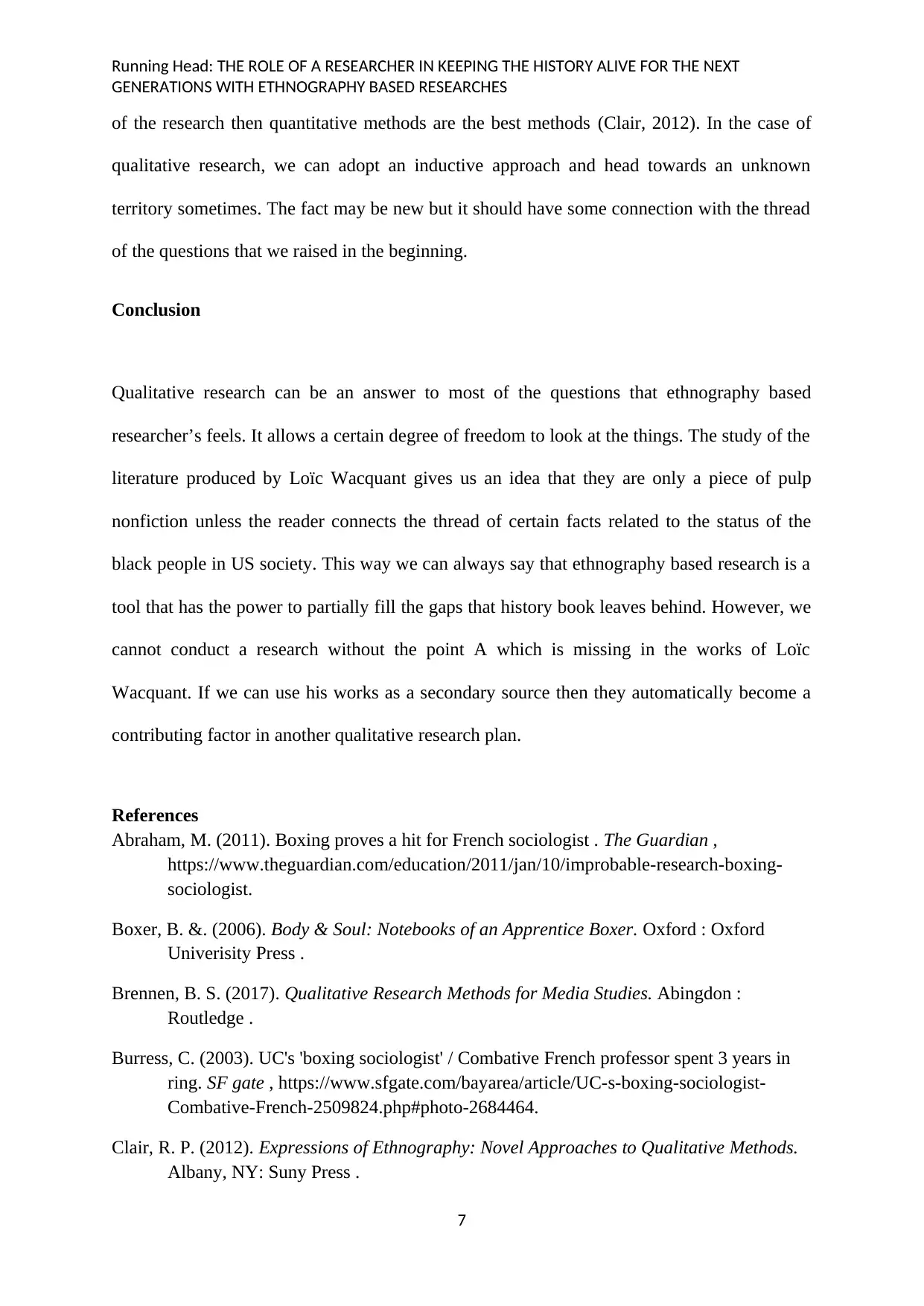
Running Head: THE ROLE OF A RESEARCHER IN KEEPING THE HISTORY ALIVE FOR THE NEXT
GENERATIONS WITH ETHNOGRAPHY BASED RESEARCHES
of the research then quantitative methods are the best methods (Clair, 2012). In the case of
qualitative research, we can adopt an inductive approach and head towards an unknown
territory sometimes. The fact may be new but it should have some connection with the thread
of the questions that we raised in the beginning.
Conclusion
Qualitative research can be an answer to most of the questions that ethnography based
researcher’s feels. It allows a certain degree of freedom to look at the things. The study of the
literature produced by Loïc Wacquant gives us an idea that they are only a piece of pulp
nonfiction unless the reader connects the thread of certain facts related to the status of the
black people in US society. This way we can always say that ethnography based research is a
tool that has the power to partially fill the gaps that history book leaves behind. However, we
cannot conduct a research without the point A which is missing in the works of Loïc
Wacquant. If we can use his works as a secondary source then they automatically become a
contributing factor in another qualitative research plan.
References
Abraham, M. (2011). Boxing proves a hit for French sociologist . The Guardian ,
https://www.theguardian.com/education/2011/jan/10/improbable-research-boxing-
sociologist.
Boxer, B. &. (2006). Body & Soul: Notebooks of an Apprentice Boxer. Oxford : Oxford
Univerisity Press .
Brennen, B. S. (2017). Qualitative Research Methods for Media Studies. Abingdon :
Routledge .
Burress, C. (2003). UC's 'boxing sociologist' / Combative French professor spent 3 years in
ring. SF gate , https://www.sfgate.com/bayarea/article/UC-s-boxing-sociologist-
Combative-French-2509824.php#photo-2684464.
Clair, R. P. (2012). Expressions of Ethnography: Novel Approaches to Qualitative Methods.
Albany, NY: Suny Press .
7
GENERATIONS WITH ETHNOGRAPHY BASED RESEARCHES
of the research then quantitative methods are the best methods (Clair, 2012). In the case of
qualitative research, we can adopt an inductive approach and head towards an unknown
territory sometimes. The fact may be new but it should have some connection with the thread
of the questions that we raised in the beginning.
Conclusion
Qualitative research can be an answer to most of the questions that ethnography based
researcher’s feels. It allows a certain degree of freedom to look at the things. The study of the
literature produced by Loïc Wacquant gives us an idea that they are only a piece of pulp
nonfiction unless the reader connects the thread of certain facts related to the status of the
black people in US society. This way we can always say that ethnography based research is a
tool that has the power to partially fill the gaps that history book leaves behind. However, we
cannot conduct a research without the point A which is missing in the works of Loïc
Wacquant. If we can use his works as a secondary source then they automatically become a
contributing factor in another qualitative research plan.
References
Abraham, M. (2011). Boxing proves a hit for French sociologist . The Guardian ,
https://www.theguardian.com/education/2011/jan/10/improbable-research-boxing-
sociologist.
Boxer, B. &. (2006). Body & Soul: Notebooks of an Apprentice Boxer. Oxford : Oxford
Univerisity Press .
Brennen, B. S. (2017). Qualitative Research Methods for Media Studies. Abingdon :
Routledge .
Burress, C. (2003). UC's 'boxing sociologist' / Combative French professor spent 3 years in
ring. SF gate , https://www.sfgate.com/bayarea/article/UC-s-boxing-sociologist-
Combative-French-2509824.php#photo-2684464.
Clair, R. P. (2012). Expressions of Ethnography: Novel Approaches to Qualitative Methods.
Albany, NY: Suny Press .
7
Paraphrase This Document
Need a fresh take? Get an instant paraphrase of this document with our AI Paraphraser
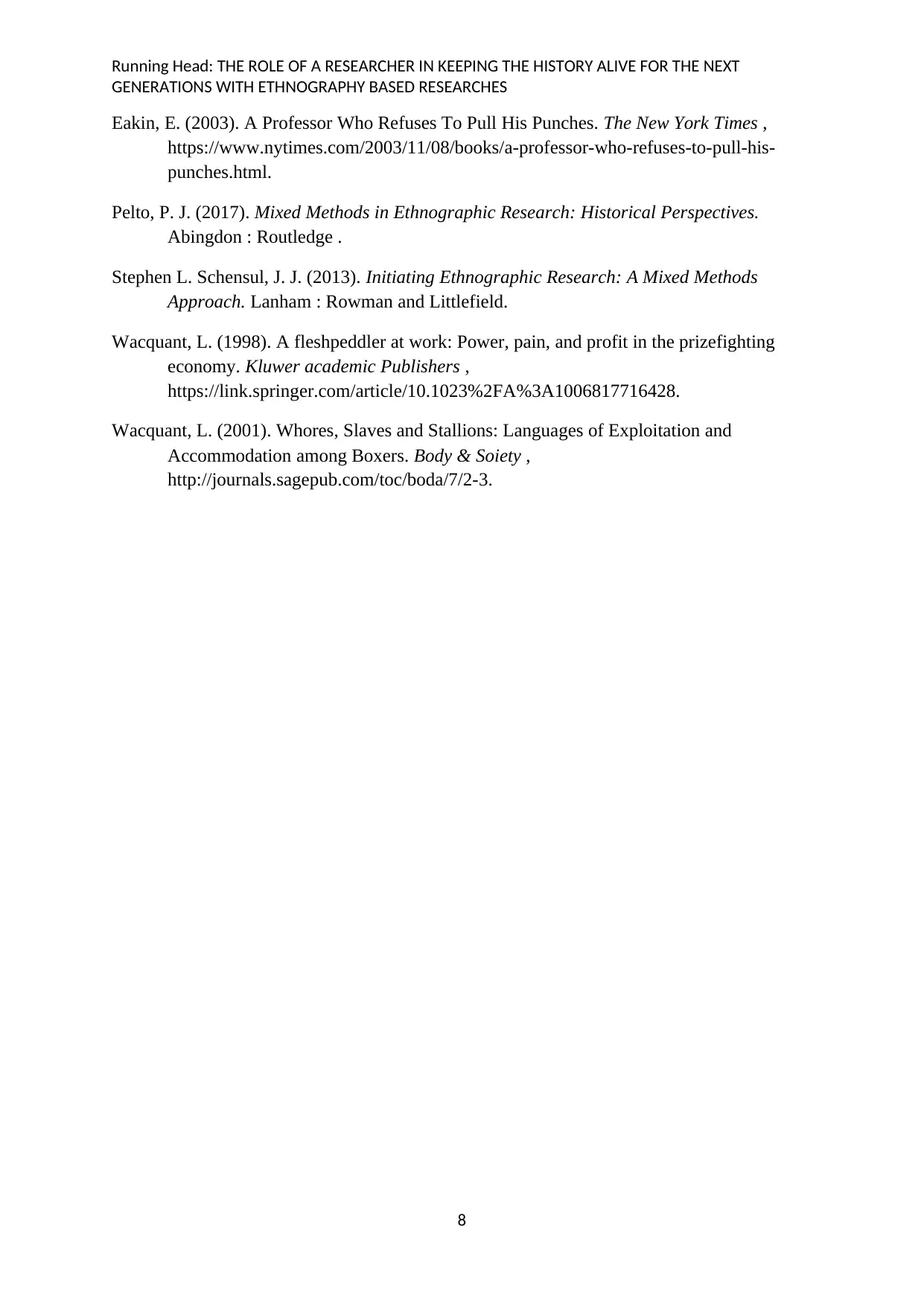
Running Head: THE ROLE OF A RESEARCHER IN KEEPING THE HISTORY ALIVE FOR THE NEXT
GENERATIONS WITH ETHNOGRAPHY BASED RESEARCHES
Eakin, E. (2003). A Professor Who Refuses To Pull His Punches. The New York Times ,
https://www.nytimes.com/2003/11/08/books/a-professor-who-refuses-to-pull-his-
punches.html.
Pelto, P. J. (2017). Mixed Methods in Ethnographic Research: Historical Perspectives.
Abingdon : Routledge .
Stephen L. Schensul, J. J. (2013). Initiating Ethnographic Research: A Mixed Methods
Approach. Lanham : Rowman and Littlefield.
Wacquant, L. (1998). A fleshpeddler at work: Power, pain, and profit in the prizefighting
economy. Kluwer academic Publishers ,
https://link.springer.com/article/10.1023%2FA%3A1006817716428.
Wacquant, L. (2001). Whores, Slaves and Stallions: Languages of Exploitation and
Accommodation among Boxers. Body & Soiety ,
http://journals.sagepub.com/toc/boda/7/2-3.
8
GENERATIONS WITH ETHNOGRAPHY BASED RESEARCHES
Eakin, E. (2003). A Professor Who Refuses To Pull His Punches. The New York Times ,
https://www.nytimes.com/2003/11/08/books/a-professor-who-refuses-to-pull-his-
punches.html.
Pelto, P. J. (2017). Mixed Methods in Ethnographic Research: Historical Perspectives.
Abingdon : Routledge .
Stephen L. Schensul, J. J. (2013). Initiating Ethnographic Research: A Mixed Methods
Approach. Lanham : Rowman and Littlefield.
Wacquant, L. (1998). A fleshpeddler at work: Power, pain, and profit in the prizefighting
economy. Kluwer academic Publishers ,
https://link.springer.com/article/10.1023%2FA%3A1006817716428.
Wacquant, L. (2001). Whores, Slaves and Stallions: Languages of Exploitation and
Accommodation among Boxers. Body & Soiety ,
http://journals.sagepub.com/toc/boda/7/2-3.
8
1 out of 8
Related Documents
Your All-in-One AI-Powered Toolkit for Academic Success.
+13062052269
info@desklib.com
Available 24*7 on WhatsApp / Email
![[object Object]](/_next/static/media/star-bottom.7253800d.svg)
Unlock your academic potential
Copyright © 2020–2026 A2Z Services. All Rights Reserved. Developed and managed by ZUCOL.





